Items
Tag
immigration
-
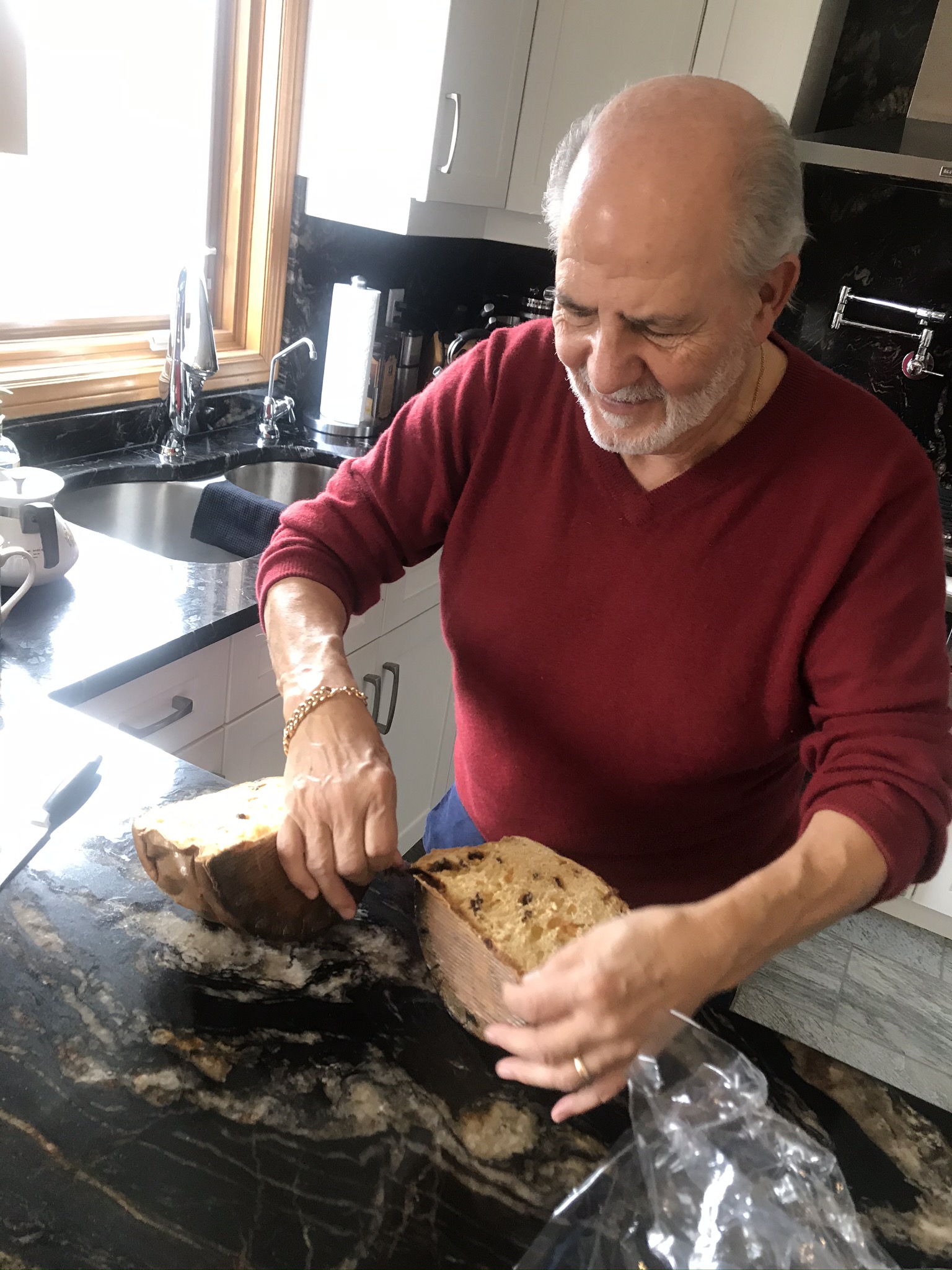 Ricordo: Keeping Italian Culture Alive Through Memory and Family Values Sam Circelli is a member of the Italian Community of London. He has lived in Canada since 1954, when he and his family immigrated from Italy at the age of 7. He describes his memories of his childhood, his transition in coming to Canada and how he keeps his Italian Culture alive. Sam also touches on how he passes these values onto his children and how Italian Culture evolves over time
Ricordo: Keeping Italian Culture Alive Through Memory and Family Values Sam Circelli is a member of the Italian Community of London. He has lived in Canada since 1954, when he and his family immigrated from Italy at the age of 7. He describes his memories of his childhood, his transition in coming to Canada and how he keeps his Italian Culture alive. Sam also touches on how he passes these values onto his children and how Italian Culture evolves over time -
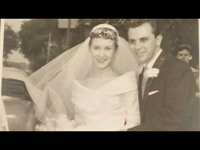 Inter-generational Discussion on Cultural Evolution The portrait examines three generations of an Italian family and how the culture is passed on through these generations. We began by discussing the migration to Canada of my community partner’s father, how he felt in the first couple of days in Canada, and how he was able to maintain his cultural heritage while being in a foreign land. We discussed how Beverly’s father would cook Italian food, go to church and listen to Italian opera to immerse himself in his roots. Beverly then expressed the importance that her father placed on family, and how this is a core value that has been passed on to her children. She then told me a story about how every Sunday, her family still gets together in her house to have Sunday supper.
Inter-generational Discussion on Cultural Evolution The portrait examines three generations of an Italian family and how the culture is passed on through these generations. We began by discussing the migration to Canada of my community partner’s father, how he felt in the first couple of days in Canada, and how he was able to maintain his cultural heritage while being in a foreign land. We discussed how Beverly’s father would cook Italian food, go to church and listen to Italian opera to immerse himself in his roots. Beverly then expressed the importance that her father placed on family, and how this is a core value that has been passed on to her children. She then told me a story about how every Sunday, her family still gets together in her house to have Sunday supper. -
 Community of Song: Latin Music in Sharing Identity and Promoting Cultural Humility In this video, Colombian-Canadian singer-songwriter Gerry Rozo, through a retelling of his personal experiences, explores the role of music in cultural identity and community-building. He discusses his journey to Canada, the progression of his music career, his thoughts on cultural humility in Canadian society, and the ways in which he believes music can be a conduit for both the preservation of cultural identity and promotion of intercultural communication.
Community of Song: Latin Music in Sharing Identity and Promoting Cultural Humility In this video, Colombian-Canadian singer-songwriter Gerry Rozo, through a retelling of his personal experiences, explores the role of music in cultural identity and community-building. He discusses his journey to Canada, the progression of his music career, his thoughts on cultural humility in Canadian society, and the ways in which he believes music can be a conduit for both the preservation of cultural identity and promotion of intercultural communication. -
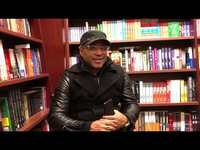 Creating Identity through Music This portrait demonstrates through various music clips, the integration of music and the importance in my partners life. Through being from a family of doctor’s in Havana, being the only musician enabled him to attend school for “free” in Cuba after being 1 of 6 chosen. Through participating in a program that enables him to arrive in Canada, and for a fee that is to be paid back to the government, is able to play concerts in Canada. He speaks about how the connection of music amongst different composers, no matter the sound or instrument, is a family and a connected language. He represents his identity through the constant listening and incorporating of music into his saxophone, drums, and piano gigs, alongside dj’ing at various clubs within London. Through tailoring his music towards the cultural crowd, and being able to adapt and fit in with the crowd with unique and current songs, brings forward the ability for various cultural groups to feel connected through the language of music. A universal language.
Creating Identity through Music This portrait demonstrates through various music clips, the integration of music and the importance in my partners life. Through being from a family of doctor’s in Havana, being the only musician enabled him to attend school for “free” in Cuba after being 1 of 6 chosen. Through participating in a program that enables him to arrive in Canada, and for a fee that is to be paid back to the government, is able to play concerts in Canada. He speaks about how the connection of music amongst different composers, no matter the sound or instrument, is a family and a connected language. He represents his identity through the constant listening and incorporating of music into his saxophone, drums, and piano gigs, alongside dj’ing at various clubs within London. Through tailoring his music towards the cultural crowd, and being able to adapt and fit in with the crowd with unique and current songs, brings forward the ability for various cultural groups to feel connected through the language of music. A universal language. -
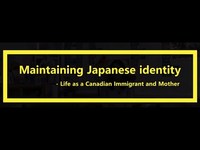 Maintaining Japanese identity: Life as a Canadian immigrant and Mother The video explores the life of Chigusa Peters who is a new Japanese immigrant to London, Ontario and also a mother of three daughters. During the interview, Chigusa first talks about her own identity and the difficulties she encountered in adapting to Canadian culture. She also discusses the differences between life in Canada and life in Japan. In the hopes of passing on Japanese traditions to her daughters, she takes them to karate classes every Monday and Wednesday, and to the Japanese language school every Saturday morning. The video ends with her talking about which aspects of Japanese culture she hopes her kids will be able to learn through these activities.
Maintaining Japanese identity: Life as a Canadian immigrant and Mother The video explores the life of Chigusa Peters who is a new Japanese immigrant to London, Ontario and also a mother of three daughters. During the interview, Chigusa first talks about her own identity and the difficulties she encountered in adapting to Canadian culture. She also discusses the differences between life in Canada and life in Japan. In the hopes of passing on Japanese traditions to her daughters, she takes them to karate classes every Monday and Wednesday, and to the Japanese language school every Saturday morning. The video ends with her talking about which aspects of Japanese culture she hopes her kids will be able to learn through these activities. -
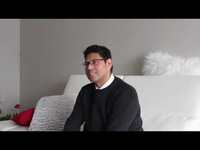 Breaking Boundaries: From Guatemala to Canada. How we share similarities, regardless of location. In this portrait, Juan Carlos Parada explains his definition of culture and provides his audience with anecdotal references to create a vibrant portrayal of his cultural background. Reminiscing on his immigration to Canada, Juan Carlos tackles the hardships of being a minority experienced by both himself and his parents. He points out his core belief of how although each culture may have superficial differences, once one looks past those differences, every individual has similarities that bring them together. In addition, Juan Carlos opens up about misconceptions associated with his culture, based on his own experiences, and concludes his story with ways to overcome stigmas. In conclusion, although Juan Carlos narrates this story through his own experiences, this portrait is one that can resonate with many people once they seek to look past differences.
Breaking Boundaries: From Guatemala to Canada. How we share similarities, regardless of location. In this portrait, Juan Carlos Parada explains his definition of culture and provides his audience with anecdotal references to create a vibrant portrayal of his cultural background. Reminiscing on his immigration to Canada, Juan Carlos tackles the hardships of being a minority experienced by both himself and his parents. He points out his core belief of how although each culture may have superficial differences, once one looks past those differences, every individual has similarities that bring them together. In addition, Juan Carlos opens up about misconceptions associated with his culture, based on his own experiences, and concludes his story with ways to overcome stigmas. In conclusion, although Juan Carlos narrates this story through his own experiences, this portrait is one that can resonate with many people once they seek to look past differences. -
 The Misunderstood: Immigrants in Canada This project displays an in-depth personal view of the experiences and challenges immigrants face during their journey to Canada. Through the personal anecdotes from Johanna Bran we discover her immigration story from Nicaragua to Canada, as well as discuss some systemic challenges and misconceptions immigrants face within Canada. “The Misunderstood: Immigrants in Canada” shows how all Canadian immigrants have their own story, but many share the same struggles and barriers living as immigrants in Canada today.
The Misunderstood: Immigrants in Canada This project displays an in-depth personal view of the experiences and challenges immigrants face during their journey to Canada. Through the personal anecdotes from Johanna Bran we discover her immigration story from Nicaragua to Canada, as well as discuss some systemic challenges and misconceptions immigrants face within Canada. “The Misunderstood: Immigrants in Canada” shows how all Canadian immigrants have their own story, but many share the same struggles and barriers living as immigrants in Canada today. -
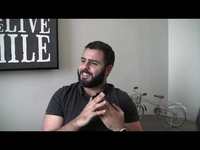 An Identity of Work: The Importance of Work and Family in the Life of an Arabic Canadian Immigrant The story of an Arabic Canadians journey in immigrating, finding employment, and regaining his identity in his chosen line of work, This is a portrait which demonstrates the struggles new immigrants face, the highs and lows of moving countries and being in new cultural contexts, and how identity can be lost and found in the work that we do. Through the lens of this portrait can be seen the truth of what it is like to search out opportunity and work hard for a dream that many Canadian citizens share: to do what you love with those you love in a place where you feel secure and happy.
An Identity of Work: The Importance of Work and Family in the Life of an Arabic Canadian Immigrant The story of an Arabic Canadians journey in immigrating, finding employment, and regaining his identity in his chosen line of work, This is a portrait which demonstrates the struggles new immigrants face, the highs and lows of moving countries and being in new cultural contexts, and how identity can be lost and found in the work that we do. Through the lens of this portrait can be seen the truth of what it is like to search out opportunity and work hard for a dream that many Canadian citizens share: to do what you love with those you love in a place where you feel secure and happy. -
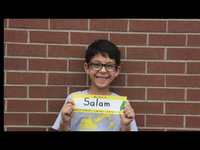 First Day of School: The Story of Iman's Son's First Day of School in Canada
First Day of School: The Story of Iman's Son's First Day of School in Canada -
 From the Manizales Home to the London Home: A Youth's Story of Immigrating from Colombia to Canada This portrait features an interview with Juan Gaviria. During this interview, he shares stories about his experiences of moving from Colombia to Canada as a youth with his family. Juan also shares his opinions on “what makes a home”. Juan talks about how he believes Colombia and Canada are both home to him, yet, he feels many differences between his two homes. In addition, Juan has also shared some specific stories about the challenges he has faced during his process of making London his new home as well as some of his heartwarming encounters in the London Latino-Canadian Community, that have helped to minimize these challenges for him. At the end of the video, Juan shares some examples of the events and activities in London that remind him of his heritage culture and his Colombia home. Juan’s sense of “home” indicates his sense of belonging to his new community. This also marks that his journey of settling in London has shaped his new identity as a Latino-Canadian. In addition, his stories have vividly illustrated the importance and impacts of cultural humility and have demonstrated how an understanding of only the surface culture without an understanding of the deep culture can cause misunderstandings and lack of respect among individuals who have different cultural backgrounds.
From the Manizales Home to the London Home: A Youth's Story of Immigrating from Colombia to Canada This portrait features an interview with Juan Gaviria. During this interview, he shares stories about his experiences of moving from Colombia to Canada as a youth with his family. Juan also shares his opinions on “what makes a home”. Juan talks about how he believes Colombia and Canada are both home to him, yet, he feels many differences between his two homes. In addition, Juan has also shared some specific stories about the challenges he has faced during his process of making London his new home as well as some of his heartwarming encounters in the London Latino-Canadian Community, that have helped to minimize these challenges for him. At the end of the video, Juan shares some examples of the events and activities in London that remind him of his heritage culture and his Colombia home. Juan’s sense of “home” indicates his sense of belonging to his new community. This also marks that his journey of settling in London has shaped his new identity as a Latino-Canadian. In addition, his stories have vividly illustrated the importance and impacts of cultural humility and have demonstrated how an understanding of only the surface culture without an understanding of the deep culture can cause misunderstandings and lack of respect among individuals who have different cultural backgrounds. -
 (Re)building a Career in Canada: A Story of Determination, Resilience and Success Salah (Sal) Al-Jajah is an architect who specializes in 3D rendering. After a successful career in Lebanon designing buildings in Dubai, Saudi Arabia, Erbil, Iraq, Egypt, England and France, Sal and his family immigrated to Canada in 2014. Sal recognized that his talent in rendering was “missing from the market” in Canada and was determined to seek out a job in London, Ontario. After knocking on many unopened doors, Sal ‘s unrelenting determination provided him with a chance to prove himself. In this video, Sal shares his success in “rebuilding” his career in Canada from start to finish. This video explores the challenges of finding employment in Canada as an immigrant. Sal’s story nuances themes of perseverance, dedication and familial love as he attempts to support his wife and three children. Sal’s success adds to the discourse surrounding immigration in Canada, by challenging stereotypes and prejudices related to immigrants in the Canadian workforce.
(Re)building a Career in Canada: A Story of Determination, Resilience and Success Salah (Sal) Al-Jajah is an architect who specializes in 3D rendering. After a successful career in Lebanon designing buildings in Dubai, Saudi Arabia, Erbil, Iraq, Egypt, England and France, Sal and his family immigrated to Canada in 2014. Sal recognized that his talent in rendering was “missing from the market” in Canada and was determined to seek out a job in London, Ontario. After knocking on many unopened doors, Sal ‘s unrelenting determination provided him with a chance to prove himself. In this video, Sal shares his success in “rebuilding” his career in Canada from start to finish. This video explores the challenges of finding employment in Canada as an immigrant. Sal’s story nuances themes of perseverance, dedication and familial love as he attempts to support his wife and three children. Sal’s success adds to the discourse surrounding immigration in Canada, by challenging stereotypes and prejudices related to immigrants in the Canadian workforce. -
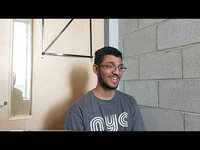 Journey of an Arabic Migration with Loay Loay’s immigration story is a unique one in that he came from another multicultural region in Dubai, U.A.E. Once an 8-year-old boy when he immigrated, he is now a 20 year old student in the field of computer engineering. He explains that integration in Canada was also made easier by his parents as he was enrolled in Islamic elementary and secondary schools. However, he emphasizes how his life and experiences have changed since leaving the Islamic school system and attending Western University and Fanshawe College now.
Journey of an Arabic Migration with Loay Loay’s immigration story is a unique one in that he came from another multicultural region in Dubai, U.A.E. Once an 8-year-old boy when he immigrated, he is now a 20 year old student in the field of computer engineering. He explains that integration in Canada was also made easier by his parents as he was enrolled in Islamic elementary and secondary schools. However, he emphasizes how his life and experiences have changed since leaving the Islamic school system and attending Western University and Fanshawe College now. -
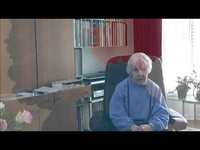 Home in Canada: Immigrant from Germany to Canada in 1980s Reinhild came from Chemnitz, Germany. She immigrated with her family to Canada in the 1980s. She taught mathematics in Western before. This video will introduce her immigrant process and the factors she thinks affect her integrated into Canada.
Home in Canada: Immigrant from Germany to Canada in 1980s Reinhild came from Chemnitz, Germany. She immigrated with her family to Canada in the 1980s. She taught mathematics in Western before. This video will introduce her immigrant process and the factors she thinks affect her integrated into Canada. -
 Finding Home: The Waves of Life A story about the struggles and hardships that come with moving to multiple countries within a short time period. What does settling mean and where does one find home.
Finding Home: The Waves of Life A story about the struggles and hardships that come with moving to multiple countries within a short time period. What does settling mean and where does one find home. -
 Fostering a Sense of Community: An Immigration Story An Immigration Story
Fostering a Sense of Community: An Immigration Story An Immigration Story -
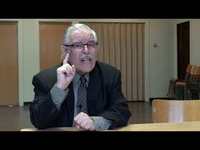 Creating Bridges: An Interview with Ziyad Ali
Al Bilad newspaper is an Arabic-English newspaper distributed in London, Mississauga and Hamilton. It was started by two business partners: Laith Al Hamadani and Ziad Ali. In this video, I interview Ziad Ali, who is also the editor in chief of the English section of Al Bilad newspaper. Al Bilad relays news from the Middle East and also contains news from Canada. You can see how Al Bilad provides bridges to people who are and would like to know about the Middle East, so that they are still intact, while also keeping up with Canadian news. In this interview I ask Ziad Ali questions about why he decided to found Al Bilad and how he deals with bias concerning choice of topics. I also ask him about his role and duty as an imam/khateeb at al Hayyat mosque (shown on the video). He likes to teach and he believes he can provide bridges by relaying knowledge and news.
Creating Bridges: An Interview with Ziyad Ali
Al Bilad newspaper is an Arabic-English newspaper distributed in London, Mississauga and Hamilton. It was started by two business partners: Laith Al Hamadani and Ziad Ali. In this video, I interview Ziad Ali, who is also the editor in chief of the English section of Al Bilad newspaper. Al Bilad relays news from the Middle East and also contains news from Canada. You can see how Al Bilad provides bridges to people who are and would like to know about the Middle East, so that they are still intact, while also keeping up with Canadian news. In this interview I ask Ziad Ali questions about why he decided to found Al Bilad and how he deals with bias concerning choice of topics. I also ask him about his role and duty as an imam/khateeb at al Hayyat mosque (shown on the video). He likes to teach and he believes he can provide bridges by relaying knowledge and news.